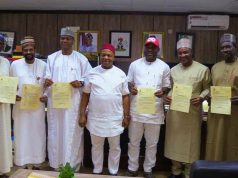By Philip Agbese
Former United States Ambassador to Nigeria, John Campbell, has finally confirmed that his obsession with making Nigeria fail has pushed him into some sort of delusion, one that requires clinical intervention. So severe that the diplomat is today hopeful of achieving what he woefully erred to implement when he was envoy between 2004 and 2007; the destruction of Nigeria by whittling down its corporate integrity.
In his latest rant for his long term employer, the Council for Foreign Relations (CFR), in an article titled “Beyond the Pandemic, Boko Haram Looms Large in Nigeria,” Campbell wrote that “Large-scale banditry is on the rise throughout Nigeria, particularly in the northwest,” without making efforts to contextualized his claim as he would have done if he were writing about his own country, the US. Any researcher that is able to write without ingrained imperialist subservience beclouding their assessment will today conclude that the United States is nowhere better than Nigeria in risks outlook and long term stability. Both nations have similar degrees of risks to stability. The only difference, however, is the degree of unrest orchestrated from the outside like the Council on Foreign Relations is doing to Nigeria.
This is the same Council on Foreign Relations that in 2015 urged the United States government to support Al Qaeda terrorists under the guise of defeating the Islamic State. It did so in an article entitled, “Accepting Al Qaeda: The Enemy of the United States’ Enemy,” authored by Foreign Affairs writer, Barak Mendelsohn. One should then wonder the extent to which CFR has gotten the US and other countries to support these bandits and terrorists that Campbell is writing about. It would seem that the American and his employers are displeased with the fact that the instability they are pushing in Nigeria is being taken in strides such that the country has not buckled as they expected.
To have a sense of what the hatchet job Campbell is trying to deliver, one only needs to look at the antecedence of CFR. In age 11 of Foreign Affairs, the journal of the CFR, December 1922 it wrote that “Obviously there is going to be no peace or prosperity for mankind so long as it remains divided into fifty or sixty independent states.
“Equally obviously there is going to be no steady progress in civilization or self-government among the more backward peoples until some kind of international system is created which will put an end to the diplomatic struggles incident to the attempt of every nation to make itself secure. The real problem today is that of world government.”
So, the agenda that Campbell and other bloodsuckers like him in CFR are pushing is to make justifications for why some countries should not exist in their current state and forms in order to remove the moral burden that should be associated with the human misery that would necessarily accompany the process of forcefully decommissioning a sovereign nation and coercing it into whatever absurd conglomeration that the folks at Council of Foreign Relations have in mind.
Thus, far from being the expert on Nigeria as Campbell fancies himself to be, he is, in reality, the assassin sent to finish off the country. Failed at the task, he is now spending his doting age trying to paint Nigeria into his imagined meltdown. The diplomat is being aided in this sinister assignment by indigenous bloggers who see the Council of Foreign Relations as a reputable platform instead of realizing that the council is the devil’s workshop that churns out the avoidable crisis in its bid to undermine nations for the interest of its equally evil members. They do not know, for instance, that CFR is entwined with the Bilderberg Group, an assemblage of sociopaths obsessed with human domination.
It is no surprise that the venom penned by the likes of Campbell have an uncanny way of becoming top news items, to the extent that less informed indigenous journalists end up regurgitating them without knowing that CFR controls a large swathe of the international media. It is therefore expected that Campbell and other carrion eaters will not stop their destabilization agenda against Nigeria anytime soon.
The dare to Campbell is for him, in good conscience, author a piece that owns up to how CFR’s desperation to defeat China has led to a spike in the security concerns in Nigeria. He should expostulate on the many scenarios that were conjured on how to frustrate the emergence of a Sino-Sahel Silk Road.
The objective is to ensure that Africa’s growing partnership with China is slowed down. While Nigeria may not be embracing China on the suffocating scale that some African countries are doing, Nigeria’s geo-strategic location, coupled with its high population and economic potentials makes it a hub that the continent’s future development naturally coalesce around, something that is being accelerated by Chinese intervention. CFR will have none of this hence the vehemence with which the country is being attacked by bandits and terrorists, who are blown away by the illusion of power without realizing that they are highly disposable pieces in a puzzle that is the plaything of the Council on Foreign Relations.
Campbell will further have to prove that his constant picking on Nigeria is not a subtle way of pressuring the authorities to allow drone strikes into Nigeria’s territory from the AFRICOM, Pentagon’s Africa Command Air Base 201 in Agadez, Republic of Niger. The $110 million war-mongering installation has been largely directed at operations in Niger and Mali, which attests to its failure since the existence of the base has not stopped the bandits and terrorists crossing into Nigeria from Niger. If penning taunting articles is Campbell’s approach to goading the country into submitting its sovereignty to the Council of Foreign Relations then he should be prepared to depart this world with that as his greatest disappointment. It will not happen.
What is rather clear is that CFR, possibly through Campbell’s contacts, since he once served in Nigeria, is using domestic proxies to provoke incidents that heighten the sense of insecurity in the country with a view to corralling the West African nation into some desired situations that advance the council’s objectives.
The likelihood of this, Campbell leveraging his domestic Nigerian contacts, is very high. He has in recent years aligned with the opposition. His most recent article was not only immediately picked up by pro-opposition blogs and news outlets in the country, its publication also coincided with an upsurge in the opposition but criticism of the security but situation, which they have not been able to prove that they are not responsible for.
Groups connected with Campbell’s indigenous associates, like Alhaji Atiku Abubakar, a former vice president, who is now in the opposition. The former US Ambassador, in all his analysis, opts to disregard the threat from his associate that the security situation in Nigeria will degenerate if he was not awarded an election win in the 2019 votes irrespective of whether the electorates chose him or not.
It is most unfortunate that Campbell is exploiting the desperation of indigenous associates like Atiku to push the Council for Foreign Relations’ agenda in Nigeria while these hapless ones think he is doing them a favour that will at some point translate into hijacking power.
In February 2007, five months before Campbell’s tour in Nigeria ended, John Bellamy Foster wrote in _the Monthly Review_ that “The lessons of history are clear: attempts to gain world dominance by military means, though inevitable under capitalism, are destined to fail and can only lead to new and greater wars.”
Thirteen years after, that message remains profound and is one that John Campbell and the Council of Foreign Relations should take to heart. Attempting to dominate Nigeria by covert military operations masked as banditry or terrorist activities will eventually end in sadness for all those involved. They too shall not be spared by the war that will ensue.
Agbese is a human rights activist and publisher based in the United Kingdom.







